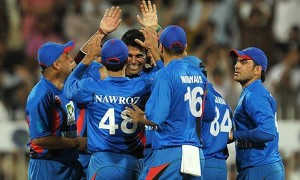Afghan cricketers rise above violence and hardship

Afghan Cricket Team. Photograph: Lakruwan Wanniarachchi/AFP/Getty Images
It is a story that has captured the imagination of not just cricket fans but people all over the world.
Afghanistan’s historic first ICC Cricket World Cup victory against Scotland has resonated everywhere; with news reports around the globe not missing the significance of the win to a people burdened with war and hardship.
Afghans know more than most about hardship and their cricket team has been forged through trial and toil. Formed less than 15 years ago, the team is made up of players who grew up in refugee camps and are now performing for a nation that has endured decades of war.
The team have become the cult heroes this World Cup, not only for Hamid Hassan’s war paint and cartwheels, but for their inspiring story and their passion on the field.
By the time it ended with the Afghans getting home by the smallest of margins – one wicket in hand and three balls remaining – the match was trending worldwide on Twitter.
A small crowd of passionate Afghanistan fans watched the historic win at Dunedin’s University Oval bursting with pride.
Online, messages of congratulations flowed in from all corners of the globe from current and former players, cricket boards, politicians.
After the match, batsman Samiullah Shenwari spoke of the sport’s growing popularity.
“There was nothing before. You can look eight or ten years ago, there was nothing in Afghanistan. But now you can see in the streets, schools, everywhere you go; it’s just cricket and cricket.”
When the team qualified for the World Cup in October 2013, the party lasted for days.
“At the airport there was a big celebration, parliament members and ministers came to the airport as well,” Captain Mohammad Nabi recalled prior to the World Cup.
Nabi, more than anyone, sums up the fascinating rise of Afghanistan cricket.
Afghanistan may be one the weakest teams at the World Cup with no real hope of winning the tournament but that just adds to the team’s mystique.
Just making it to the sport’s greatest spectacle is a victory in itself for a country torn apart by war and with little cricketing heritage.
Adversity is a part of life for Afghanistan’s cricketers and for many, including Nabi, the sport became their salvation.
Like most of his team mates, Nabi grew up in a Pakistan refugee camp during the Soviet War in Afghanistan.
It was there that he first learnt the game of cricket, spending hours each day playing on dirt fields with a tennis ball.
“You play cricket a lot in refugee camps,” he told reporters when he first arrived in Australia this month for the World Cup.
An all-rounder, the long days he spent honing his skills in the dust soon paid off and he began to rise through the ranks of Pakistan cricket.
In 2007, he was invited to play for the Marylebone Cricket Club in England, making his first-class debut that year, scoring 43 and taking one wicket against the touring Sri Lankans.
In 2009, Nabi made his one-day international debut for Afghanistan against Scotland during the qualifying tournament for the 2011 World Cup.
Nabi was named man of the match after top scoring with 58 runs. Afghanistan won the match but did not qualify for the World Cup. That would have to wait another four years.
Afghanistan had more success in Twenty20, qualifying for the 2010, 2012 and 2014 World Cups. They did not make it past the first round but Nabi made an impressive 31 against India in 2012.
In 2013, Afghanistan clinched their place in the 2015 50-overs World Cup, after a two-year qualifying tournament, sparking wild celebrations back home.
But Nabi was given a first-hand reminder of the reality of the hardships in his troubled homeland. At the same time as he was trying to help his country qualify for the World Cup, his father was abducted and held to ransom.
The armed kidnappers demanded a seven-figure payment for his release but were eventually caught after three months and Nabi’s father was freed, unharmed.
It was a worrying time but the 30-year-old Nabi is looking forward not backwards hoping his team’s unlikely appearance at the World Cup will inspire more of his compatriots.
“Now I am the captain of Afghanistan in our first World Cup,” he said.
“I am very happy to represent Afghanistan in the World Cup and hopefully I’ll enjoy the whole tournament.”
Laurie Nowell
AMES Senior Journalist












